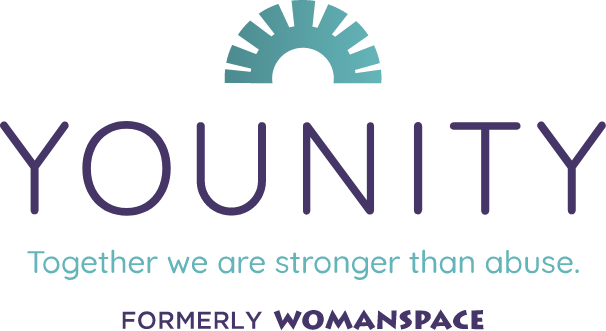Peace begins at home is the cornerstone on which the mission of Womanspace was created 41 years ago. Inherent in that belief is the absolute necessity of respect and mutual respect. As adults, we lead by example, starting in families where young girls and boys can learn that they have the right to say “no” to unwanted touch. We need to teach our little girls that their voice matters and teach our little boys it is critical that they hear and respect those voices as well as knowing their own voice matters to say “no.” The news today is filled with so many stories about the violation of boundaries and about the voices of victims and survivors speaking out for the first time. It is imperative that we listen to those voices and help our children understand the importance of respecting the experiences of others.
As a parent, it is sometimes difficult to know how to talk about these issues. Children are never too young to learn about boundaries and respect. The root of violence against individuals, domestic and sexual violence starts early; therefore, the conversation needs to start now.
Talk about boundaries and respect. If you are a parent or a significant adult in a child’s life, you can emphasize everyone’s right to say no to an unwanted touch. Ted Bunch, Chief Development Officer of A Call To Men, helps to educate men on healthy, respectful manhood and aims to prevent violence against women. “We have to have conversations much earlier about respectful boundaries,“ Bunch said, “We’re talking about respecting your body and the bodies of others, being able to say no and understanding that someone is not supposed to touch me in certain ways.” A conversation with a child is imperative to tell them “If somebody wants to give you a hug, it’s OK to say, I don’t want a hug.” For older boys, this might mean cultivating a clear conversation about consent. It is important to model behavior at home.
Make it clear that emotions are OK. It is important to teach our boys to have the full range of emotions, let them cry and experience their feelings. Model gender equality at home, things like equal chores for daughters and sons. Most of all, tell your children they can come to you with anything without judgment that no topic is off the table. Raising kind children will ensure the maturing of kind adults.
Womanspace programs and services continue to evolve as needs in the community grow and change. This evolution includes being a daily voice in the community for respect and consent. Since 1977, Womanspace has served over 368,725 individuals effected by interpersonal violence; 71,393 women, 13,717 children and 5,153 men. During fiscal year July 2016 through June 2017, Womanspace served a total of 11,900 adults and children, providing them with critical lifesaving services including:

